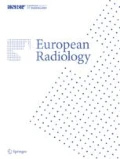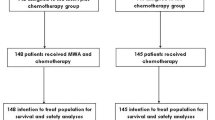Abstract
Objectives
To verify the association between EGFR status and clinical response to microwave ablation (MWA) and survival.
Methods
NSCLC patients with known EGFR status and treated with MWA in combination with chemotherapy were retrospectively enrolled in the study.
Results
A total of 61 patients were recruited. EGFR mutations were found in 28 patients (39.4 %), and were more common in women (67.7 %) and nonsmokers (74.1 %). Complete ablation was achieved in 69.7 % of patients with EGFR mutant tumours and in 82.1 % of patients with EGFR wild-type tumours (p = 0.216). The median progression-free survival (PFS) and overall survival (OS) were 8.3 months and 27.2 months in patients with an EGFR mutant tumour. The corresponding values were 5.4 months (p = 0.162) and 17.8 months (p = 0.209) in patients with an EGFR wild-type tumour. Patients with complete ablation had longer PFS (7.8 months vs. 4.2 months, p = 0.024) and OS (28.1 months vs. 12.6 months, p = 0.001) than those with incomplete ablation. Multivariate analyses also showed that response to MWA was an independent prognostic factor for OS, but EGFR status was not, and that neither response to MWA nor EGFR status was a prognostic factor for PFS.
Conclusions
The EGFR status was not related to response to MWA, and response to MWA was a predictor of survival.
Key Points
• EGFR mutations were commonly seen in women and in nonsmokers
• EGFR status had no correlation with the response to MWA, PFS and OS.
• The response to MWA could predict PFS and OS.




Similar content being viewed by others
References
Chen W, Zheng R, Zhang S et al (2014) Annual report on status of cancer in China, 2010. Chin J Cancer Res 26(1):48–58
Schiller JH, Harrington D, Belani CP et al (2002) Comparison of four chemotherapy regimens for advanced non-small-cell lung cancer. N Engl J Med 346:92–98
Scagliotti GV, Parikh P, von Pawel J et al (2008) Phase III study comparing cisplatin plus gemcitabine with cisplatin plus pemetrexed in chemotherapy-naive patients with advanced-stage non-small-cell lung cancer. J Clin Oncol 26(21):3543–3551
Mok TS, Wu YL, Thongprasert S et al (2009) Gefitinib or carboplatin-paclitaxel in pulmonary adenocarcinoma. N Engl J Med 361:947–957
Rosell R, Moran T, Queralt C et al (2009) Screening for epidermal growth factor receptor mutations in lung cancer. N Engl J Med 361:958–967
Maemondo M, Inoue A, Kobayashi K et al (2010) Gefitinib or chemotherapy for non-small-cell lung cancer with mutated EGFR. N Engl J Med 362:2380–2388
Mitsudomi T, Morita S, Yatabe Y et al (2010) Gefitinib versus cisplatin plus docetaxel in patients with non-small-cell lung cancer harbouring mutations of the epidermal growth factor receptor (WJTOG3405): an open label, randomised phase 3 trial. Lancet Oncol 11:121–128
Zhou C, Wu YL, Chen G et al (2011) Erlotinib versus chemotherapy as first-line treatment for patients with advanced EGFR mutation-positive non-small-cell lung cancer (OPTIMAL, CTONG-0802): a multicentre, open-label, randomised, phase 3 study. Lancet Oncol 12:735–742
Takahashi T, Sonobe M, Kobayashi M et al (2010) Clinicopathologic features of non-small-cell lung cancer with EML4-ALK fusion gene. Ann Surg Oncol 17:889–897
Kwak EL, Bang YJ, Camidge DR et al (2010) Anaplastic lymphoma kinase inhibition in non-small-cell lung cancer. N Engl J Med 363(18):1693–1703
Liu H, Steinke K (2013) High‐powered percutaneous microwave ablation of stage I medically inoperable non‐small cell lung cancer: a preliminary study. J Med Imaging Radiat Oncol 57(4):466–474
Lu Q, Cao W, Huang L et al (2012) CT-guided percutaneous microwave ablation of pulmonary malignancies: results in 69 cases. World J Surg Oncol 10:80
Carrafiello G, Mangini M, De Bernardi I et al (2010) Microwave ablation therapy for treating primary and secondary lung tumours: technical note. Radiol Med 115(6):962–974
Wei Z, Ye X, Yang X et al (2015) Microwave ablation in combination with chemotherapy for the treatment of advanced non-small cell lung cancer. Cardiovasc Intervent Radiol 38(1):135–142
Wei Z, Ye X, Yang X et al (2015) Microwave ablation plus chemotherapy improved progression-free survival of advanced non-small cell lung cancer compared to chemotherapy alone. Med Oncol 32(2):464
Thatcher N, Chang A, Parikh P et al (2005) Gefitinib plus best supportive care in previously treated patients with refractory advanced non-small-cell lung cancer: results from a randomised, placebo-controlled, multicentre study (Iressa Survival Evaluation in Lung Cancer). Lancet 366:1527–1537
Gow CH, Chien CR, Chang YL et al (2008) Radiotherapy in lung adenocarcinoma with brain metastases: effects of activating epidermal growth factor receptor mutations on clinical response. Clin Cancer Res 14(1):162–168
Eichler AF, Kahle KT, Wang DL et al (2010) EGFR mutation status and survival after diagnosis of brain metastasis in nonsmall cell lung cancer. Neuro Oncol 12(11):1193–1199
Lee HL, Chung TS, Ting LL et al (2012) EGFR mutations are associated with favorable intracranial response and progression-free survival following brain irradiation in non-small cell lung cancer patients with brain metastases. Radiat Oncol 7:181
Yagishita S, Horinouchi H, Katsui Taniyama T et al (2015) Epidermal growth factor receptor mutation is associated with longer local control after definitive chemoradiotherapy in patients with stage III nonsquamous non-small-cell lung cancer. Int J Radiat Oncol Biol Phys 91(1):140–148
Mak RH, Doran E, Muzikansky A et al (2011) Outcomes after combined modality therapy for EGFR-mutant and wild-type locally advanced NSCLC. Oncologist 16(6):886–895
Ye X, Fan WJ, Chen JH et al (2015) Chinese expert consensus workshop report: guidelines for thermal ablation of primary and metastatic lung tumors. Thorac Cancer 6:112–121
Yang JC, Wu YL, Schuler M et al (2015) Afatinib versus cisplatin-based chemotherapy for EGFR mutation-positive lung adenocarcinoma (LUX-Lung 3 and LUX-Lung 6): analysis of overall survival data from two randomised, phase 3 trials. Lancet Oncol 16(2):141–151
Deschamps F, Farouil G, Ternes N et al (2014) Thermal ablation techniques: a curative treatment of bone metastases in selected patients? Eur Radiol 24(8):1971–1980
Qian GJ, Wang N, Shen Q et al (2012) Efficacy of microwave versus radiofrequency ablation for treatment of small hepatocellular carcinoma: experimental and clinical studies. Eur Radiol 22(9):1983–1990
Yu J, Liang P, Yu XL et al (2015) Local tumour progression after ultrasound-guided microwave ablation of liver malignancies: risk factors analysis of 2529 tumours. Eur Radiol 25(4):1119–1126
Nour-Eldin NE, Naguib NN, Mack M et al (2011) Pulmonary hemorrhage complicating radiofrequency ablation, from mild hemoptysis to life-threatening pattern. Eur Radiol 21(1):197–204
Gillams AR, Lees WR (2008) Radiofrequency ablation of lung metastases: factors influencing success. Eur Radiol 18(4):672–677
Das AK, Sato M, Story MD et al (2006) Non-small-cell lung cancers with kinase domain mutations in the epidermal growth factor receptor are sensitive to ionizing radiation. Cancer Res 66(19):9601–9608
Das AK, Chen BP, Story MD et al (2007) Somatic mutations in the tyrosine kinase domain of epidermal growth factor receptor (EGFR) abrogate EGFR-mediated radioprotection in non-small cell lung carcinoma. Cancer Res 67(11):5267–5274
Lubner MG, Brace CL, Hinshaw JL et al (2010) Microwave tumor ablation: mechanism of action, clinical results, and devices. J Vasc Interv Radiol 21(8 Suppl):S192–S203
Scappaticci AA, Yoo DC (2012) Recurrence of lung cancer after radiofrequency ablation detected by PET/CT and contrast enhanced CT scan. Med Health R I 95:146–148
Ryan ER, Sofocleous CT, Schoder H (2013) Split-dose technique for FDG PET/CT-guided percutaneous ablation: a method to facilitate lesion targeting and to provide immediate assessment of treatment effectiveness. Radiology 268:288–295
Fang S, Wang Z, Guo J et al (2014) Correlation between EGFR mutation status and response to first-line platinum-based chemotherapy in patients with advanced non-small cell lung cancer. Onco Targets Ther 7:1185–1193
Zhang Q, Dai HH, Dong HY et al (2014) EGFR mutations and clinical outcomes of chemotherapy for advanced non-small cell lung cancer: a meta-analysis. Lung Cancer 85(3):339–345
Acknowledgments
The scientific guarantor of this publication is Xin Ye. The authors declare no relationships with any companies whose products or services may be related to the subject matter of the article. This study received funding from Shandong Province Medical and Health Science and Technology Development Projects (2014WS0346). Zhigang Wei has significant statistical expertise. Institutional Review Board approval was obtained. Written informed consent was obtained from all subjects (patients) in this study. None of the study subjects or cohorts have been previously reported. This retrospective observational study was performed at one institution.
Author information
Authors and Affiliations
Corresponding author
Rights and permissions
About this article
Cite this article
Wei, Z., Ye, X., Yang, X. et al. Advanced non small cell lung cancer: response to microwave ablation and EGFR Status. Eur Radiol 27, 1685–1694 (2017). https://doi.org/10.1007/s00330-016-4474-4
Received:
Revised:
Accepted:
Published:
Issue Date:
DOI: https://doi.org/10.1007/s00330-016-4474-4




